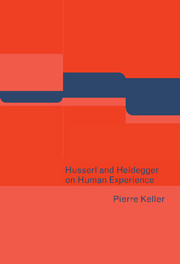Book contents
- Frontmatter
- Contents
- Introduction
- 1 Experience and intentionality
- 2 Husserl's methodologically solipsistic perspective
- 3 Husserl's theory of time-consciousness
- 4 Between Husserl, Kierkegaard, and Aristotle
- 5 Heidegger's critique of Husserl's methodological solipsism
- 6 Heidegger on the nature of significance
- 7 Temporality as the source of intelligibility
- 8 Heidegger's theory of time
- 9 Spatiality and human identity
- 10 “Dasein” and the forensic notion of a person
- Select bibliography
- Index
4 - Between Husserl, Kierkegaard, and Aristotle
Published online by Cambridge University Press: 02 November 2009
- Frontmatter
- Contents
- Introduction
- 1 Experience and intentionality
- 2 Husserl's methodologically solipsistic perspective
- 3 Husserl's theory of time-consciousness
- 4 Between Husserl, Kierkegaard, and Aristotle
- 5 Heidegger's critique of Husserl's methodological solipsism
- 6 Heidegger on the nature of significance
- 7 Temporality as the source of intelligibility
- 8 Heidegger's theory of time
- 9 Spatiality and human identity
- 10 “Dasein” and the forensic notion of a person
- Select bibliography
- Index
Summary
In this chapter I first introduce Heidegger's conception of human experience against the background of his critique of Husserl's consciousness-based conception of experience. I then discuss the manner in which Heidegger comes to understand human experience as a process of disclosure. I argue that this conception of human experience as disclosure is based on a critical interpretation of Husserl's notion of Evidenz against the background of a new inter-pretation of Aristotle. I then look at the way Heidegger appropriates and transforms Husserl's theory of categorial intuition so that it forms the basis for his own conception of truth as disclosure. Then I look at the manner in which Heidegger uses the notion of truth as spatial and temporal disclosure to undermine the subjective implications of the notion of consciousness and intentionality. I conclude with some of the skeptical implications of Heidegger's own conception of truth.
INTENTIONALITY, THE CONCEPT OF A PERSON, AND HUMAN EXISTENCE
Heidegger claims that it is a reading of Brentano's discussion of the different senses of being in Aristotle that initially sets him on his philosophical path. In fact, Heidegger initially comes to study Husserl through his interest in the way that Husserl has developed Brentano's philosophical reinterpretation of the scholastic notion of intentionality. This interest in Brentano is, in turn, motivated by Brentano's philosophical reconstruction of key scholastic doctrines using the resources of Aristotle's thought.
After writing a dissertation on the problem of psychologism in the theory of judgment that is already strongly influenced by Husserl's Investigations, as well as by Ideas 1, Heidegger goes on to discuss the scholastic theory of intentionality, meaning, and categories in his habilitation (1915).
- Type
- Chapter
- Information
- Husserl and Heidegger on Human Experience , pp. 84 - 110Publisher: Cambridge University PressPrint publication year: 1999



